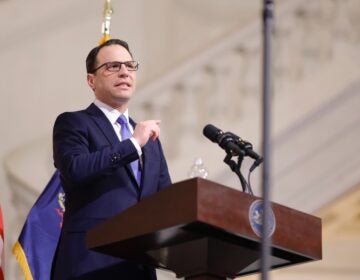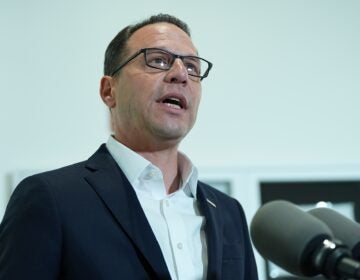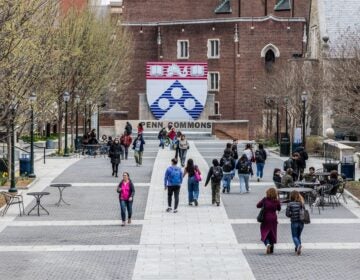Where Gov. Josh Shapiro stands on immigration issues — in Pa. and beyond
Approximately 7.7% of Pennsylvanians are foreign-born — close to 1 million residents. More than half are naturalized citizens eligible to vote.
Listen 2:43
Gov. Josh Shapiro waves to the crowd at a campaign event in Montgomery County for Kamala Harris with Gov. Gretchen Whitmer of Michigan. (Carmen Russell-Sluchansky)
What questions do you have about the 2024 elections? What major issues do you want candidates to address? Let us know.
Throughout his political career, Pennsylvania Gov. Josh Shapiro has engaged with immigration issues at the local and national levels. As the Montgomery County native is being considered for the vice presidential slot on the Democratic ticket this election, here’s a closer look at Shapiro’s track record on immigration issues.
Shapiro as state attorney general
Shapiro took several steps to protect immigrant communities in Pennsylvania and challenge former President Donald Trump’s executive orders related to immigration as state attorney general from 2017 to 2023. Along with other state attorneys general, Shapiro challenged Trump’s travel ban on citizens from Muslim-majority countries and the administration’s policy of separating families at the border.
He also joined more than 20 attorneys general and attorneys-general-elect in challenging the Trump administration’s changes to the “public charge” rule that made it more difficult for immigrants to seek to adjust their status if they accessed any kind of government services.
Shapiro also opposed Trump’s move to declare a national emergency at the U.S.-Mexico border to draw on additional funds to build a wall there.
However, at the local level, Shapiro as attorney general did not publicly commit to support for the Shut Down Berks Coalition, which fought to close the Berks County Residential Center outside of Reading. Up to 100 immigrants, including children, were detained at the center at any given time from when it was opened in 2001 until its closure in Jan. 2023.
David Bennion, executive director of Free Migration Project, said advocates met in person with Shapiro when he was attorney general.
“I remember that he expressed willingness to help and he expressed empathy for the families,” Bennion said. “But after that meeting, and despite lots of follow-up efforts, we never saw any response, we never saw any action.”
“There are many things he could have done, to engage with Governor Wolf, to take action in his role as the head prosecutor for the state, or even just speak out publicly against the prison,” Bennion added. “We never saw anything.”
Shapiro as governor
In March, Shapiro refused to send the state National Guard to the border when Texas Gov. Greg Abbott was asking for other states’ support in responding to increased numbers of migrants. Pennsylvania state Senate Republicans passed legislation urging the governor to send the Pennsylvania National Guard, but Shapiro did not comply, insisting an act of Congress is required to pass legislation to reform the current immigration system.
Shapiro’s secretary of transportation, Mike Carroll, supported legislation that would allow undocumented immigrants to obtain driver’s licenses, although the governor has never publicly spoken out in support of the bill.
The state law was changed following Sept. 11, 2001. Previously, it was possible for all Pennsylvania residents, regardless of immigration status, to obtain a driver’s license. Many advocates say it’s a top priority for immigrant communities throughout the state.
Advocacy organization MILPA, which is pushing for driver’s license legislation to be passed via the Driving PA Forward coalition, said in a statement that they’ve “shared directly with the Shapiro administration over the last 19 months the need for immigrant Pennsylvanians to be able to access non-real ID driver’s licenses, privacy protections for the information for driver’s license holders, universal legal representation for families facing deportation, and strengthened workplace protections for immigrant workers.”
“We hope that this governor can use his voice and position to help make these important changes a reality for so many Pennsylvania families,” they said.
Approximately 7.7% of Pennsylvanians are foreign-born — close to 1 million residents. More than half are naturalized citizens eligible to vote. An additional 400,000-plus Pennsylvanians are U.S.-born citizens who live with at least one immigrant parent.
Anuj Gupta is the CEO of the Welcoming Center, a Philadelphia-based nonprofit that promotes economic growth through immigrant integration. He said the Shapiro administration has been supportive of immigrant communities, although there are changes he would like to see at the state level to strengthen immigrant integration.
Gupta said Shapiro has been successful in carrying on former Gov. Tom Wolf’s efforts to strengthen the state executive branch’s relationship with immigrant communities. Those included establishing commissions on Asian American and Pacific Islander affairs and Latino affairs, and celebrating religious holidays like Diwali at the governor’s mansion.
Shapiro also appointed a deputy chief of staff to “be the lead on questions of immigrant integration,” Gupta said — a position which hadn’t existed before.
“There’s a signal that the state government is open for all communities that are calling Pennsylvania home, a place where they want to do business,” Gupta said.
Despite those measures, Julio Rodriguez, political director at Pennsylvania Immigration and Citizenship Coalition (PICC), said Shapiro’s relationship to immigrant communities and their priorities is “unclear.”
“There’s about 10 different bills that are pro-immigrant that are currently in the Legislature that we’ve asked his administration to support,” Rodriguez said. “And they’ve simply said, ‘Send us the information,’ they’ve taken it back, and they’ve always had the same response of, ‘Hey, if this bill makes it to our desk, then we’ll have a follow-up conversation.’”
Rodriguez said PICC as a whole thinks the governor “could be doing way more,” especially given that he comes from Montgomery County, which nearly 100,000 immigrants call home.
“We would have thought that him being from a place where there’s a large immigrant population that he would be … a big supporter that other governors have been. But we have not seen that to be the case,” he said.
Bennion said the governor hasn’t supported work the Free Migration Project is doing to help longtime immigrant residents of the state who are subjected to a 1996 law that mandates deportation of non-citizens in the case of criminal convictions, including low-grade or even nonviolent offenses.
“That gives me concern for what his role on immigration policy at a federal level might look like, given what we’ve seen, where the state, and him as governor or attorney general, already has some impact or some role to play for immigrant communities here,” Bennion said. “We’ve not seen a lot of appetite for that sort of community engagement on the part of the governor or the lieutenant governor so far.”
Looking ahead
Gupta said that in his interactions with the administration on behalf of The Welcoming Center, Shapiro and senior officials in his cabinet have shown a “deep understanding” of “what immigrant integration means to Pennsylvania’s economy going forward,” and have helped The Welcoming Center explore opportunities to expand the impact they’ve had in Philadelphia to other parts of the state.
Gupta explained that many parts of the state have seen “staggering” population decline, and immigration is foundational to revitalizing those towns and their local economies.
A 2023 report from the Brookings Institution found that if there was zero immigration, the U.S. would see a population decline of more than 100 million people between 2022 and 2100.
“Everyone in elected office needs to understand that Pennsylvania is on a population precipice, and if we do not become a place where immigrants are welcome to pursue opportunity, we will see towns and cities in the state disappear,” Gupta said.
According to the American Immigration Council, immigrants contribute more than $13 billion in taxes every year and make up almost 10% of the state’s workforce.
Gupta said Pennsylvania could do a better job with language accessibility, and that there should be an Office of New Pennsylvanians established in the governor’s office, or in the Department of Community and Economic Development.
Gupta said the state should also designate more funding to immigrant economic integration.
“[Immigrants] are the primary pipeline for population stability and growth, and consequently they are the primary pipeline for our workforce not just of tomorrow, but of today,” he said. “We have labor shortages in almost every profession, every category and every industry. You’re not going to fill those unless you embrace immigration, the numbers simply don’t exist.”
Rodriguez agreed that the economic wellbeing of the U.S. is tied to immigration.
“The U.S. without immigration is not going to succeed … The only reason why the country is not worse off is because of immigrants,” he said.
Rodriguez said that for the vice presidential pick, whether it’s Shapiro or another candidate, PICC is advocating for the closure of local detention centers in Pennsylvania and Elizabeth, New Jersey. An average of 35,000 people are detained daily by Immigration Customs and Enforcement (ICE) nationwide.
The second request: That the candidate stop supporting immigration bills, such as the Border Security Act, “which fundamentally hurt people seeking asylum,” Rodriguez said.
Gupta said he thinks Shapiro would have the ability to lead on immigration issues at the national level as well.
“The governor is somebody who understands, who prioritizes economic growth,” he said. “And he’s also somebody that has been as probably as effective as you can be in finding bipartisan solutions. I think he could actually be a unique actor to break through the nonsense, and the silos that we have carved out on this issue, politically. Because there is a bipartisan path that goes through the economics of immigration.”

Get daily updates from WHYY News!
WHYY is your source for fact-based, in-depth journalism and information. As a nonprofit organization, we rely on financial support from readers like you. Please give today.








